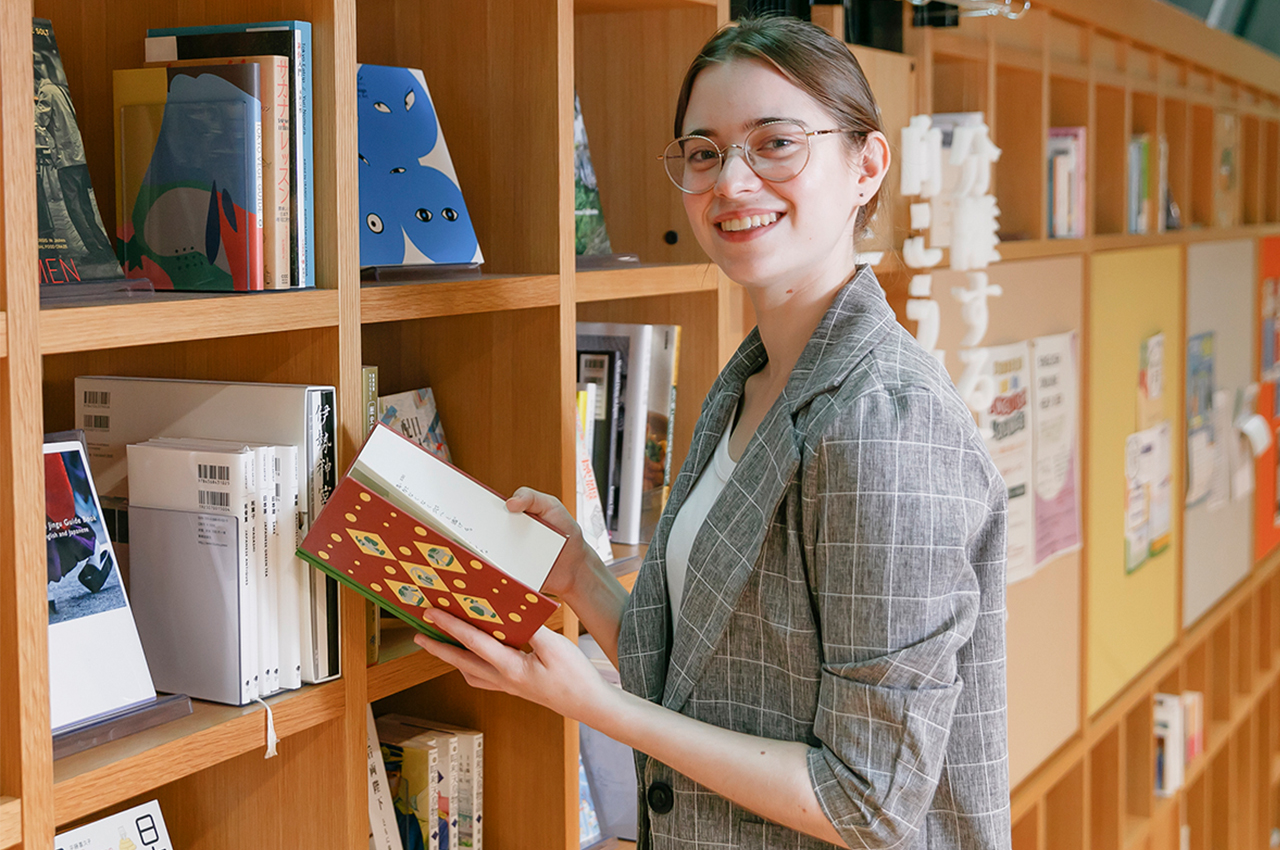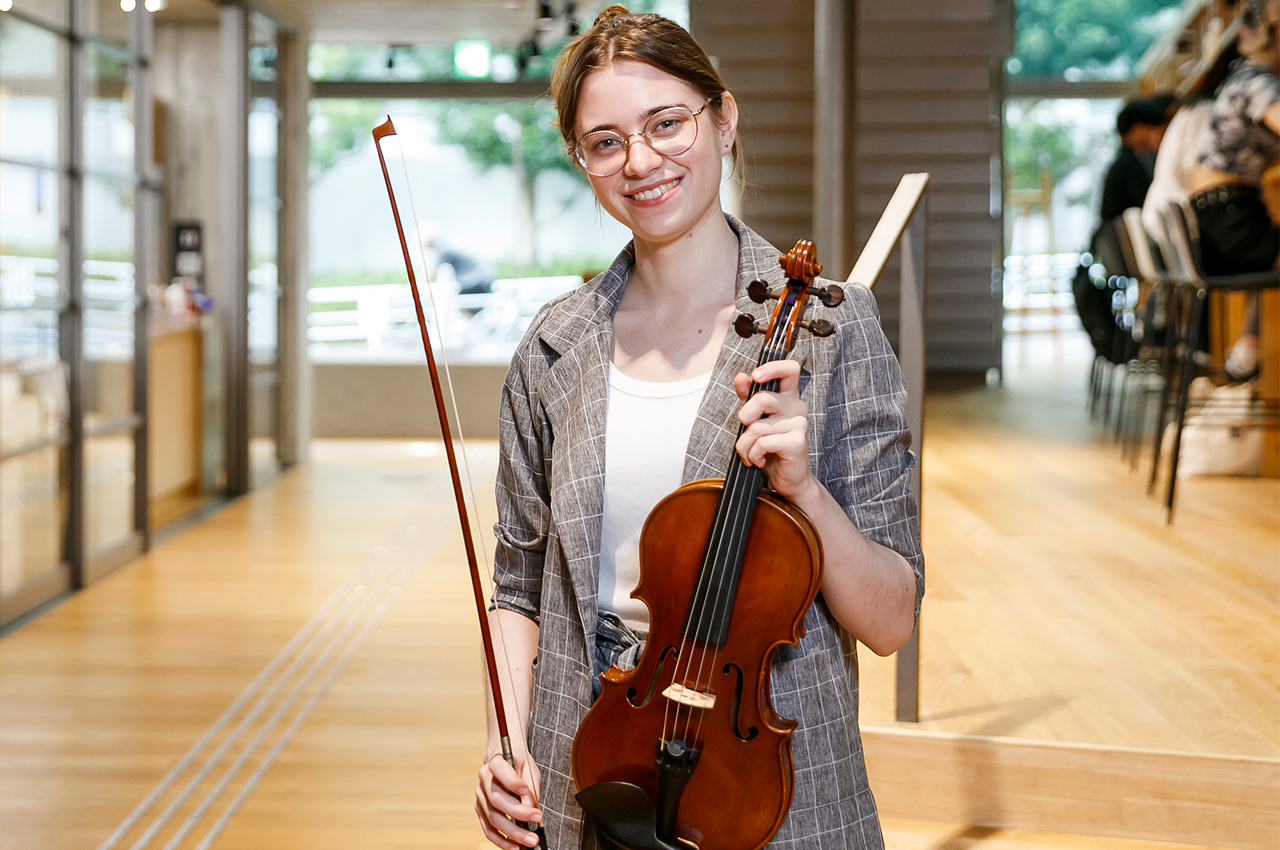Captivated by the Gentle Sound of Japanese, Studying Japanese in Belgium, and Researching Children’s Songs During a Study Exchange
Updated on Feb 03 2025

Emmanuelle, who has a deep love for Japan and music, arrived in Japan as an exchange student from Belgium in April 2024. She is currently researching Japanese children’s music at the Graduate School of Kokugakuin University. She spoke lively and fluently in Japanese about how she first encountered Japan, the appeal she finds in the country, her plans during her study abroad, and her future dreams.
Encountering Japan at Age 15
Emmanuelle, who is studying Japanese Studies at the Catholic University of Leuven in Belgium, is currently in her first year of her Master’s program. She came to Japan as an exchange student at the Graduate School of Kokugakuin University. How did someone from such a distant European country come to encounter Japan?”
”When I was 15, I became fascinated with Japanese anime like NARUTO and FAIRY TAIL. That was the intitial spark. I found the sound of Japanese to be gentle and beautiful, and I wanted to be able to speak it.”
For Emmanuelle, sound and resonance are very important. Influenced by her mother, a music teacher, she began playing the violin at age 4. However, being shy, she expressed her unspoken thoughts and emotions through the violin, rather than words. One can sense how sensitive she must have been as a young girl, even as an adult. Music has been like an essential friend, supporting her through tough and sad times.
”Kanji is especially difficult in Japanese, but I think it’s beautiful because each character carries meaning and imagery. When I entered the University of Leuven and learned that ‘music’ was written as ‘音楽’ (ongaku) in Japanese, I was moved. The idea of enjoying sound—that is the true essence of music.
At the University of Leuven, Emmanuelle has learned Japanese conversation, reading comprehension, kanji, vocabulary, and grammar, while also studying Japanese culture and history. When it came time to write her bachelor’s thesis, she chose the topic of Japanese music as a theme that felt uniquely her own. Although she had been involved with music for a long time, she knew very little about Japanese music, and her curiosity was piqued. Having been supported by music since childhood, she decided to pursue Japanese children’s music in particular. Around that time, she met Professor Fujisawa at the University of Leuven. Impressed by Professor Fujisawa’s beautiful way of speaking and her passion for ukiyo-e, Emmanuelle’s desire to study abroad at the Graduate School of Kokugakuin University grew stronger.

Emmanuelle, who is researching Japanese children’s songs at the graduate school. The book she is holding is an old children’s song book, which had been sent to her by a friend and finally arrived on the day of the interview.
Every Day Filled with Surprises and New Insights
Until then, she had traveled to various countries in Europe, but this was her first time staying long-term, especially so far away from Belgium, in Japan. Was she not worried?
”The excitement of being able to go to Japan was much greater than any concerns. That said, I was honestly a bit nervous about taking all my classes in Japanese. While I could manage daily conversations, it was a different story when it came to research jargon and specialized terms in class… Even in Belgium, we sometimes struggle to understand highly specific lectures.”
However, she managed to get by by asking her seminar classmates for help and looking things up on her smartphone. With the kindness of her peers, she now finds her classes enjoyable. On the other hand, one area where she still struggles to adjust is presentations. At Kokugakuin University, students are required to create a resume in advance and present while reading from the text. In contrast, at the University of Leuven, the style was to present freely in one’s own words, so creating a resume was quite difficult for her. She smiles at this challenge, acknowledging it as part of her encounter with a different culture.
Since she had researched Japan thoroughly before her study abroad, she says she never experienced a real culture shock. However, she was pleasantly surprised by the kindness of people, the punctuality and convenience of the trains, and the courteous service at shops. On the other hand, she feels a bit confused by how people tend to be overly considerate in communication, sometimes not expressing their own feelings. “I believe that only when we communicate our feelings can we truly understand each other.” In Belgium, people are more direct in expressing their thoughts and discussing things openly. Emmanuelle, who has always considered herself shy in Belgium, laughs and says that she doesn’t feel shy at all. She sees this as a valuable experience—how one’s self-perception can change depending on the environment.

Having studied Japanese for four years at the Catholic University of Leuven, Emmanuelle came to Japan. She spoke about the charm of Japan in fluent Japanese. She laughs and says that every day is fulfilling, and she hasn’t felt homesick.
Working to Connect People
Currently, Emmanuelle is focused on her research for her Master’s thesis, which is due in June 2025. Her main topic is children’s music, specifically traditional children’s songs (dōyō songs). The more she learns about figures like Noguchi Ujō and Kitahara Hakushū, the more she feels the importance of the lyrics. She’s researching the history of children’s songs, their effect on children’s emotions, and more, by reviewing materials at the National Diet Library and visiting memorial museums—learning experiences that are unique to Japan. She also mentions that if there were any seminars on children’s songs at music universities, she would love to participate.
Additionally, Emmanuelle had an internship as part of the required curriculum for her Master’s program at the University of Leuven, where she worked full-time for seven weeks at the Belgian Embassy in Japan around May.
”From 9:20 AM to 5:20 PM every day, and sometimes working evenings for planned events. I had a busy schedule. My tasks included attending press conferences and meetings as well as submitting reports to my superiors. Doing background research on various topics, I also had a go at translating and interpreting, and even answering the phone. I was nervous about answering the phone and wasn’t very good at it (laughs).”
Emmanuelle has always valued connecting people through music. During her Japanese Studies at university, she also learned about international relations, specifically in the context of Japan, which sparked her interest in working as an embassy staff member, a role that connects people from different nations. Although her dream is to work in embassies around the world, her love for Japan means that above all, she would love to return to Japan and work at the Belgian Embassy in Tokyo as a diplomat.
”I want to wear a kimono! I want to visit Hida Takayama, which is the hometown of one of my professors at the University of Leuven! I want to play violin in the Kokugakuin University orchestra!”
When asked about things she’d like to do before returning home, Emmanuelle eagerly shared many desires. She laughed, saying she has too many things she wants to do, and not enough time. Living in Japan, her love for the country has only deepened. Through her eyes and words, Japan feels rich and warm. It makes one feel proud to be Japanese. We can imagine that students who interact with Emmanuelle every day also have moments of reflection about Japan through her. We hope that the experiences she’s having during her time abroad will lead to a future where she can return to Japan one day as an embassy staff member.

Having lived with music as a close companion since childhood, Emmanuelle brought her cherished violin with her for her studies abroad. She expresses her wish to perform with the orchestra at Kokugakuin University.

